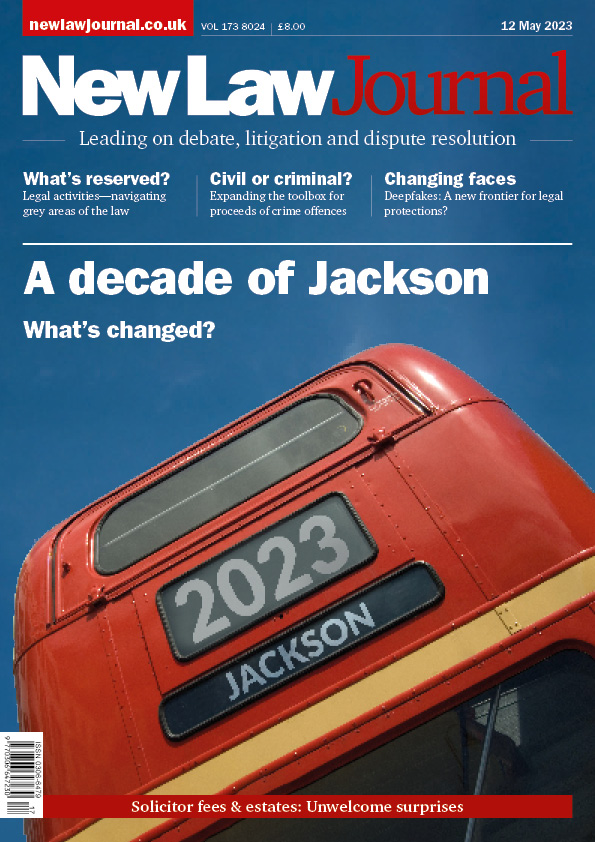THIS ISSUE

Ten years ago, Sir Rupert Jackson’s civil costs review was a seismic event. How well have the ground-breaking reforms fared since? NLJ columnist Professor Dominic Regan takes a look at the Jackson legacy.
The use of deepfake technology is on the rise, and can look alarmingly realistic. Consequently, there is vast potential for harm. But can existing laws provide any protection against malicious use?
What exactly are reserved legal activities (RLAs), and what is meant by ‘conducting litigation’? It’s an area of the law rife with uncertainties, as shown by the recent case of Baxter v Doble.
Who put the civil into proceeds of crime cases? Civil remedies such as account freezing (AFOs) and forfeiture orders have come to dominate what was once an overwhelmingly criminal concern, Hickman & Rose partner Andrew Katzen and associate Olivia Dwan write in this week’s NLJ.
How have Sir Rupert Jackson’s ground-breaking reforms to civil procedure fared ten years on? Dominic Regan considers the work done & the work to come
Is the term ‘transparency’ an unlawful euphemism for open justice? David Burrows reviews the powers of the president of the Family Division to pilot transparency
Wearing too many hats? In this month’s brief, Ian Smith addresses the confirmation of the rule against multiple employers, lingering COVID fears at work, & civil proceedings orders
The High Court has provided welcome guidance on what exactly constitutes the conduct of litigation: Iain Miller & Charlotte Judd examine this perilously grey area of the law
Andrew Katzen & Olivia Dwan analyse what the growing dominance of civil proceedings in proceeds of crime means for practitioners
MOVERS & SHAKERS

Keystone Law—Milena Szuniewicz-Wenzel & Ian Hopkinson
International arbitration team strengthened by double partner hire

Coodes Solicitors—Pam Johns, Rachel Pearce & Bradley Kaine
Firm celebrates trio holding senior regional law society and junior lawyers division roles

Michelman Robinson—Sukhi Kaler
Partner joins commercial and business litigation team in London
NEWS
The Legal Action Group (LAG)—the UK charity dedicated to advancing access to justice—has unveiled its calendar of training courses, seminars and conferences designed to support lawyers, advisers and other legal professionals in tackling key areas of public interest law
Refusing ADR is risky—but not always fatal. Writing in NLJ this week, Masood Ahmed and Sanjay Dave Singh of the University of Leicester analyse Assensus Ltd v Wirsol Energy Ltd: despite repeated invitations to mediate, the defendant stood firm, made a £100,000 Part 36 offer and was ultimately ‘wholly vindicated’ at trial
The Police and Criminal Evidence Act 1984 transformed criminal justice. Writing in NLJ this week, Ed Cape of UWE and Matthew Hardcastle and Sandra Paul of Kingsley Napley trace its ‘seismic impact’
Operational resilience is no longer optional. Writing in NLJ this week, Emma Radmore and Michael Lewis of Womble Bond Dickinson explain how UK regulators expect firms to identify ‘important business services’ that could cause ‘intolerable levels of harm’ if disrupted
As the drip-feed of Epstein disclosures fuels ‘collateral damage’, the rush to cry misconduct in public office may be premature. Writing in NLJ this week, David Locke of Hill Dickinson warns that the offence is no catch-all for political embarrassment. It demands a ‘grave departure’ from proper standards, an ‘abuse of the public’s trust’ and conduct ‘sufficiently serious to warrant criminal punishment’







